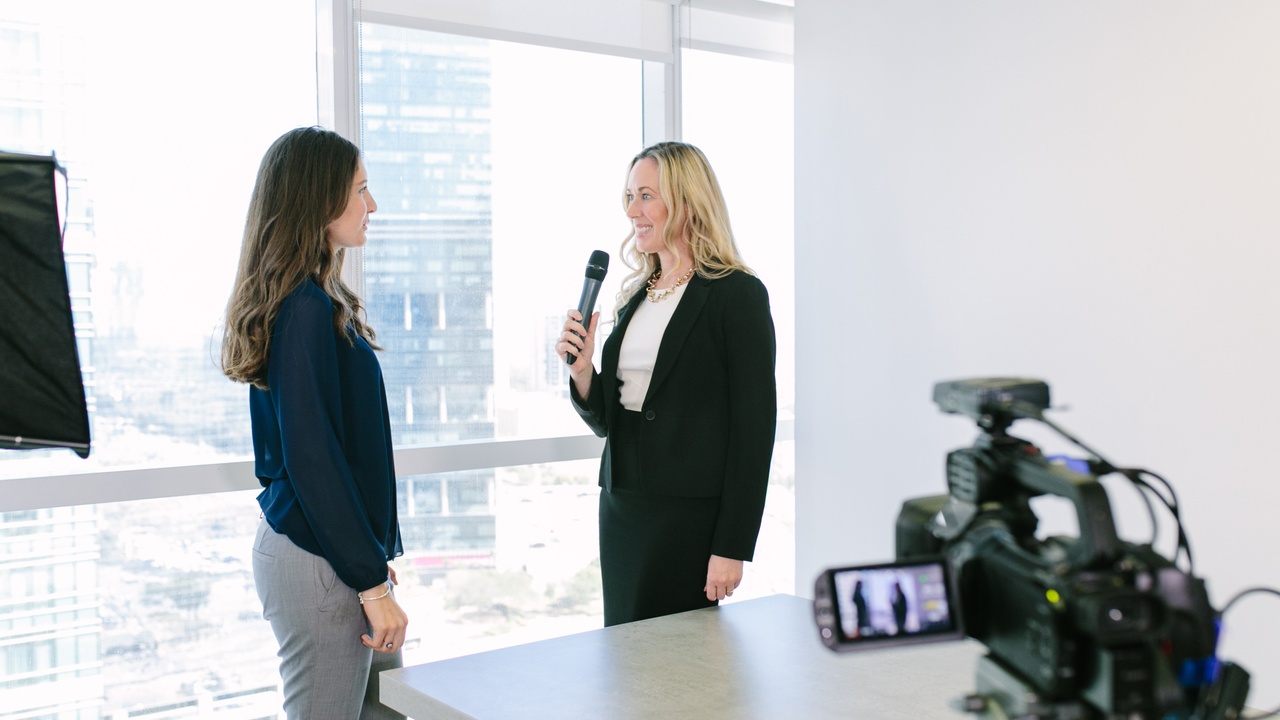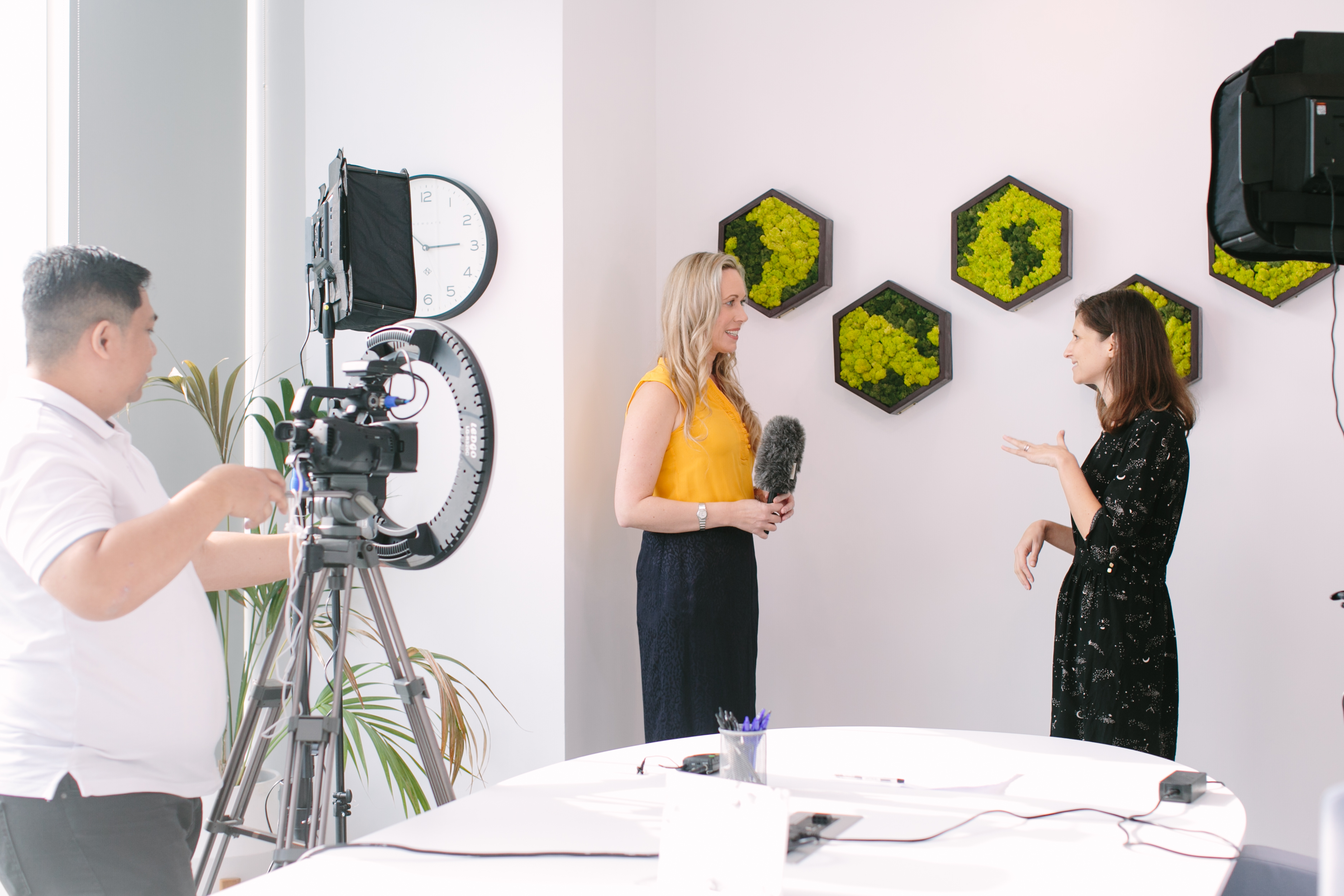What is media training anyway?
Apr 15, 2021
It’s not called ‘car crash TV’ for nothing. The chances are you’ve witnessed a wreck of an interview on screen before. What’s frightening is it’s not just the average citizen who cannot be trusted in front of a camera, but often a senior executive, politician, company spokesperson or even a CEO who have unwittingly caused a PR disaster at worst, or at very best, an uninspired performance when presenting themselves to the public.
This is exactly the scenario that scares people off from talking to the media. Often a brilliant opportunity to share an important opinion or a corporate win – the chance to present yourself, or represent your company should be a brilliant way to gain credible exposure for your message, and create a positive public image for your organisation or initiative.
With media training, you can allay those fears and feel confident when asked to not only speak to the media, but also, in a virtual world of online presenting. It’s perfectly natural to feel uneasy in what feels like a forced scenario, especially when you have no visible audience to read reactions, and in 2021 when so much of our communications are being conveyed from behind a screen.

The idea of working with journalists and editors, particularly if you are not used to it, or have had a previously bad experience, can be daunting. Being able to formulate key messages and statements, and ‘saying the right thing at the right time’ comes more down to practice and the correct guidance, not just luck. Learning to manage the media effortlessly, and present a confident and articulate persona is an opportunity that anyone can make their own.
At The Communications Works we’ve had decades of experience working with nervous executives, preferred spokespeople, PR teams and organisational leaders themselves ,to help them feel well prepared and confident in interview or presentation scenarios. Some people are more naturally adept at this than others, but we can tell you that we have never met anyone who didn’t need the help. This is why media training is more important than ever. Suddenly everyone is a presenter or spokesperson, with video based information the fastest growing source of content, and most of our pitches and presentations being done online
So what is media training and who is it for?
The stakes can be high when you talk to the media. Get it right, and the publicity will transmit your message to the heart of your target audience, in a format that your audience will trust. Get it wrong, and at best you’ve wasted your time; at worst, that same trust in the media will work against you.
Making a great impression in the media is an opportunity available to everyone – with the right preparation and training. Even at the height of a crisis, knowing what to say, when, and how, results in confident and effective interviews – and this is where media training can help.
The goal of media training is to prepare you in representing your company, brand or organisation positively in the public eye. A specialised form of communication skills, media training will enable you to predict questions, avoid the common pitfalls and ensure you can focus on delivering the key messages that you wish to convey.
Media training will teach you how use your words, tone and body language to deliver key points in a powerful and engaging way. Media training is an essential tool for anyone who is called upon to give interviews or comments to the public, an executive who acts as a company spokesperson, CEOs, management and leaders who need to be coherent and interact effectively with reporters and presenters, either online or in person.
Making the unnatural feel normal
An interview scenario is almost always a contrived situation where nerves can abound. The last impression you want to give is one of discomfort or awkwardness.
Media training shows you what not to do…
As much as it teaches you the right way, solid media training will also show you what to avoid. It’s usually a fear of ‘messing up’ that dents people’s confidence and stops them from capitalising on opportunities. Training you to be a better communicator will leave you at ease with the more awkward questions, a journalist’s ‘spin’ on the story will not take you by surprise, and the ability to sidestep any embarrassing comments that leave you never wanting to speak to the media again. You’ll have both the skills to share your mission and viewpoints, as well as the ability to take on critics effectively.
Timing is everything
And this goes before you’ve even spoken to anyone. Effective media training will show you how to deliver a timely and accurate message. When the public want or need to hear from you, waiting too long makes your organisation appear both unprepared or ‘in hiding’. Conversely, being too quick off the mark to comment can seem rushed, badly considered or even defensive in response.
Cross-communications
Your media career will see you conducting interviews face to face, in front of a camera, on the radio and also via email. A well-trained professional will understand the nuances of each, and the often-subtle ways to convey your message when body language is out of the equation, making your words and tone more important than ever.
Manage your needs and expectations
Good media training works with you as an individual, or the unique organisation that you are part of. There is never a ‘one size fits all’, and you could be preparing for a one off launch, results reporting, ongoing campaigns or getting ‘ready to react’. You might already understand that preparation is key, and utilising media training will help you or your company be positively reactive – because the last thing you need when the news calls for you, is to feel hurried, unclear and nervous.
Spotting opportunities
When you are comfortable with your media messaging, you will be able to act with agility and understand the opportunities that you can have to amplify your brand or business. You will understand what is newsworthy, (and importantly what is not), what exactly makes a good story, and a journalist’s eye on the talking points that an editor will be interested in. At the beginning of your media journey, it can feel as if the interviewer holds all the cards. He or she gets to choose what questions to ask, and what answers to use online, in print and broadcast (unless it is live).

Give good quotes and sound bites
With media training, you’ll be taught to how to use facts, examples and anecdotes to illustrate, substantiate and bring to life each of your key messages. You’ll learn how to use examples that are appropriate to the media that will publish or broadcast your interview. Besides information, what a journalist is really looking for in an interview is a set of strong quotes to illustrate the story. The same goes for text as for broadcast: quotes add colour, authority, immediacy, personality, and humanity. Being able to ‘give good quotes’ is so important. Using strong and lively language and short sentences so that your words can be edited easily are what the media is looking for. Usually, you will only get a few sentences of your own direct speech in a print article, or 15 seconds in an edited news broadcast. The reporter will choose the quote that best illustrates their story – so you need to make sure it is one that helps your agenda. Your own view on what makes a good quote or sound bite, is so often not what a journalist is looking for – an expert insight via media training as to what this could look like for you and your story can make all the difference in a news outlet using you as a spokesperson time and time again – we need to make their jobs as easy as possible!
Refresh and review
We live in unique times – maybe you’ve had a media training session before – maybe it was brief, and it no longer feels relevant? Maybe it was in the 1990s and in that case, it is definitely no longer relevant! The media landscape changes constantly, and even what worked pre Covid-19 is not necessarily working today. When you train with an experienced media company, your trainers will be a mixture of broadcast and print journalists with tier-1, international experience alongside skilled communications professionals who have delivered thousands of sessions across the globe at the highest level – ‘in the field’ and translating that experience to training you – that ‘to the minute’ insight on the news landscape will keep you ahead of your competitors, whether new to media, or looking to up skill.
The Communications Works’ media interview coaching and training is designed to help spokespeople make the most of any media encounter by understanding and clearly communicating their key messages. The TCW approach helps spokespeople garner credibility and impact with their audiences, influencing what they think, feel, say and do.
For more than 20 years, our world-class team of journalists and senior consultants has delivered media interview essentials, refresher sessions, advanced media interviews, crisis media interviews, press conference preparation, online media interviews and both group and one-to-one training and coaching across the globe.
If you think we can help you, and we are sure we can – get in touch here
FREE DOWNLOAD
THE ULTIMATE ONLINE PRESENTATION CHECKLIST
Online presentations might look easy, but they are actually harder than they appear. In this essential guide we share with you our tried and tested techniques to master your online presentations.


